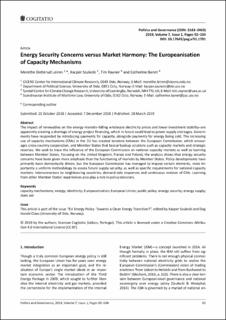| dc.contributor.author | Leiren, Merethe Dotterud | |
| dc.contributor.author | Szulecki, Kacper | |
| dc.contributor.author | Rayner, Tim | |
| dc.contributor.author | Banet, Catherine | |
| dc.date.accessioned | 2021-06-17T11:47:37Z | |
| dc.date.available | 2021-06-17T11:47:37Z | |
| dc.date.created | 2019-06-18T12:32:25Z | |
| dc.date.issued | 2019 | |
| dc.identifier.citation | Politics and Governance. 2019, 7 (1), 92-104. | en_US |
| dc.identifier.issn | 2183-2463 | |
| dc.identifier.uri | https://hdl.handle.net/11250/2759971 | |
| dc.description.abstract | The impact of renewables on the energy markets–falling wholesale electricity prices and lower investment stability–are apparently creating a shortage of energy project financing, which in future could lead to power supply shortages. Govern ments have responded by introducing payments for capacity, alongside payments for energy being sold. The increasing use of capacity mechanisms (CMs) in the EU has created tensions between the European Commission, which encour ages cross-country cooperation, and Member States that favour backup solutions such as capacity markets and strategic reserves. We seek to trace the influence of the European Commission on national capacity markets as well as learning between Member States. Focusing on the United Kingdom, France and Poland, the analysis shows that energy security concerns have been given more emphasis than the functioning of markets by Member States. Policy developments have primarily been domestically driven, but the European Commission has managed to impose certain elements, most im portantly a uniform methodology to assess future supply security, as well as specific requirements for national capacity markets: interconnectors to neighbouring countries, demand side responses and continuous revision of CMs. Learning from other Member States’ experiences also play a role in policy decisions. | en_US |
| dc.language.iso | eng | en_US |
| dc.publisher | Cogitatio | en_US |
| dc.rights | Navngivelse 4.0 Internasjonal | * |
| dc.rights.uri | http://creativecommons.org/licenses/by/4.0/deed.no | * |
| dc.subject | capacity mechanisms | en_US |
| dc.subject | energy | en_US |
| dc.subject | electricity | en_US |
| dc.subject | Europeanisation | en_US |
| dc.subject | European Union | en_US |
| dc.subject | public policy | en_US |
| dc.subject | energy security | en_US |
| dc.subject | energy supply | en_US |
| dc.subject | state aid | en_US |
| dc.title | Energy security concerns versus market harmony: The Europeanisation of capacity mechanisms | en_US |
| dc.type | Journal article | en_US |
| dc.type | Peer reviewed | en_US |
| dc.description.version | publishedVersion | en_US |
| dc.source.pagenumber | 92-104 | en_US |
| dc.source.volume | 7 | en_US |
| dc.source.journal | Politics and Governance | en_US |
| dc.source.issue | 1 | en_US |
| dc.identifier.doi | 10.17645/pag.v7i1.1791 | |
| dc.identifier.cristin | 1705660 | |
| cristin.unitcode | 7475,0,0,0 | |
| cristin.unitname | CICERO Senter for klimaforskning | |
| cristin.ispublished | true | |
| cristin.fulltext | original | |
| cristin.qualitycode | 1 | |

